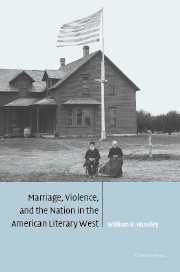Book contents
- Frontmatter
- Contents
- List of illustrations
- Acknowledgments
- Introduction
- 1 Western unions
- 2 Turner's rhetorical frontier
- 3 Marrying for race and nation: Wister's omniscience and omissions
- 4 Polygamy and empire: Grey's distinctions
- 5 Unwedded West: Cather's divides
- 6 Accident and destiny: Fitzgerald's fantastic geography
- 7 Promises and betrayals: Joan Didion and Wallace Stegner
- Afterword
- Notes
- Index
Afterword
Published online by Cambridge University Press: 22 September 2009
- Frontmatter
- Contents
- List of illustrations
- Acknowledgments
- Introduction
- 1 Western unions
- 2 Turner's rhetorical frontier
- 3 Marrying for race and nation: Wister's omniscience and omissions
- 4 Polygamy and empire: Grey's distinctions
- 5 Unwedded West: Cather's divides
- 6 Accident and destiny: Fitzgerald's fantastic geography
- 7 Promises and betrayals: Joan Didion and Wallace Stegner
- Afterword
- Notes
- Index
Summary
One subject of this study, the imbrication of literary and historical forms of knowledge, raises these questions: what do western literary critics want from western historians and their writing of history, and what do historians want from literature and literary theory? Put another way: what do these two disciplines imagine the other lacks? I pose these questions as matters of desire because the disciplines of literary and historical study have often envied and emulated each other, competed with and cross-dressed as the other. At times they have conjugated, at others divorced; at still others lived in unholy contention: as R. Gordon Kelly once put it, “the marriage between literary criticism and history seems not to have been made in heaven.” Marjorie Garber has written about “discipline envy,” that form of interdisciplinary desire in which disciplines mark their distinctions from each other while containing the disciplined other within themselves. The dialogue between disciplines is not simply one between self and other but within the self-as-other, an internalized dialogue within each about what it is not and hence what it imagines itself to be. Not surprisingly, a discipline often does not recognize itself in what other disciplines imagine about or desire from its methods and its (unstable) objects, such as “fiction” and “historical truth.”
I want briefly to look at some of those imaginations and desires on the part of western literary critics and historians, particularly as scholars engage the implications of postmodernist theory for what they do.
- Type
- Chapter
- Information
- Marriage, Violence and the Nation in the American Literary West , pp. 224 - 233Publisher: Cambridge University PressPrint publication year: 2002

